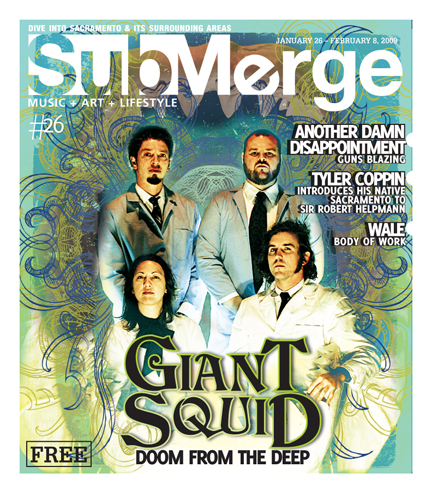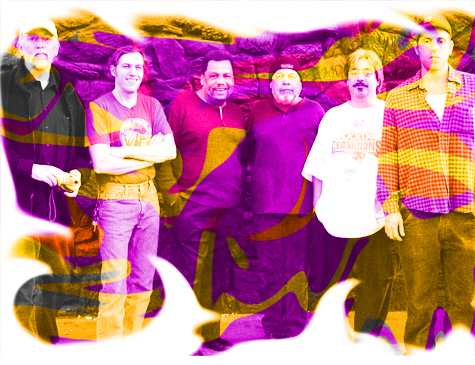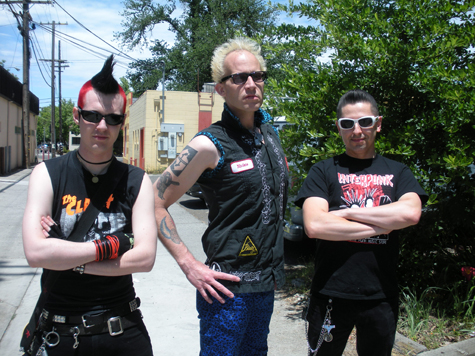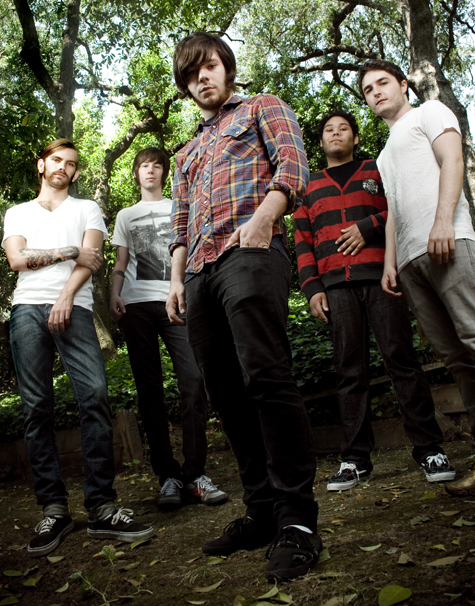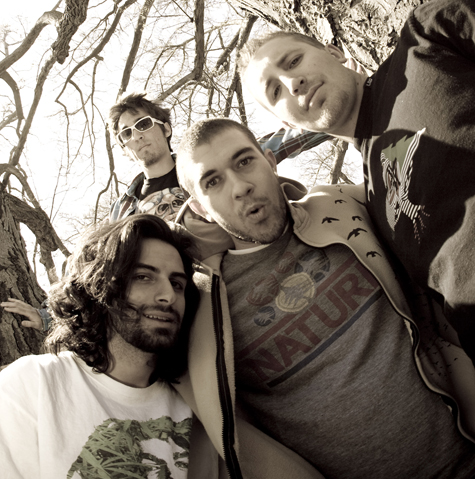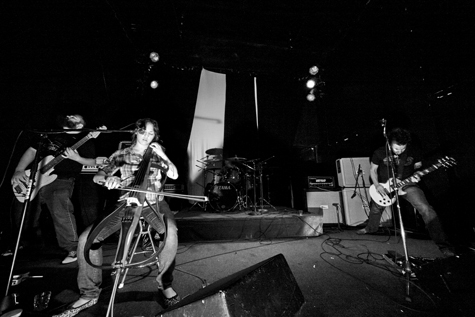Sean Barfly Examines MindX’s Addictive Brew
In 1996, Sean Barfly arranged a jam session at Sacramento’s historic Golden Buddha. He didn’t know then, and seems to this day baffled, that the convergence of musicians would generate what is now a decade-long journey into the fluid annals of MindX. Having schmoozed with some of jam-rock’s most well-to-do performers through various grassroots connections, Barfly soon found himself at the nexus of a thriving chemistry of songwriting, one that boasts an Americana/bluegrass concoction, full of extended compositions and brimming with pop culture parody (“a sick, warped, demented, politically incorrect sense of humor,” hails their bio. And it’s true).
The band has gone through some major changes during the course of its career, with the original quartet disbanding in 2000. It wasn’t until Shawn King and Rick Zamora joined in on percussion and lead guitar respectively that the necessary building blocks were in place for a solid future. In 2003, Peter Philis and Martin Holland joined in and the unit was set. MindX was now ready to saturate the avenues of back porch country, wheat-in-yer-cap bluegrass and flannel-clad Americana for a community perfectly poised for it all.
The long-running jam heroes will be releasing their new album, Jonesers and Tweakers, on June 26. The album features an impressive list of collaborators, including Steve Kimock, Melvin Seals, the late Martin Fierro, Jimmy Pailor, Peter Grant, Tony Passarell and others. Despite a heavy schedule, the band continues to be a staple on the Sacramento Happy Hour circuit, while also readying a comprehensive “party band” tour of bluegrass festivals throughout the summer.
Barfly took time out of his schedule (which may or may not include preparing for a solo gig in Amsterdam this August) to discuss with Submerge the ins and outs of one of Sacramento’s most ballyhooed jam bands, as well as exactly what the hell is the Slapaho Nation. Here we go!
It seems you didn’t set out to do anything more than form a band you could jam with. How does it feel to have now been around for over 10 years and have created a sort of niche within the jam scene?
I really didn’t have a vision of putting “a band” together at the time. I had already played in bands and understood the concept of playing arranged songs, but wanted to really try to let go and see what could be created rhythmically and melodically, and wanted to see what could happen with various textures harmonically. What came out of that was just the opposite. The first six years with Gerry Pineda, David Vandusen and Eric Crownover was the first time I was in a real “band.” Sure, there was some jamming, but our strength was our complexity, arrangements and great chemistry for what we were doing at the time. MindX became a jam band after the original band was no longer playing together and Martin Holland, Peter Philis, Shaun King and Rick Zamora joined the band. As far as how it feels 10 years later, well I guess the best description is trying to reinvent what we do and keep it interesting for the band, as well as our fans.
Explain the Slapaho Nation to the novice of MindX.
Ah, the Slapaho Nation. The whole joke started out with our former bass player Gerry Pineda. He was already a busy working professional when we were fortunate enough to have him play with us, but he was unable to play all the gigs we threw at him. He was in demand for obvious reasons, and we affectionately called him a “ho.” We were booked to play the Trinity Tribal Stomp Music Festival, a festival that is a benefit for various Native American Indian tribes that was held in Trinity County for many years. On the way to the gig in our car, we came up with our own tribe called the Slapaho Tribe, mocking the nickname we had given to our Chief (Gerry Pineda), and it was born. The funny thing is, it has never been a gender thing, and it seems it can be taken out of context and turned into a whole other thing that we find ridiculous if you really know any of us personally.
Has being the only original member left in the band done anything drastic to the direction of the band from a thematic or chemistry standpoint?
Once the original quartet dissolved, MindX became more of the band I originally had conceptualized. We were much more of a jam band, and I think the band members had much more in common musically. The new band was open to far more ideas that I had than the previous lineup, but I think that was more because the band had run its course. The direction of the band at this point was directed by me, which were big shoes to fill as the former group was a total democracy creatively.
It’s difficult to pin down the tongue-in-cheek from the serious moments of your music. How much of it is parody, and how much of it is to be taken seriously?
My philosophy when making a studio record is the jam band thing simply does not work in the studio. My favorite parts of the former band are what works in the studio—complexity and comedy! It’s amazing; we will play a show and throw some complex material at the crowd and you’ll always hear someone scream, “White Trash Town” or “Salty Balls” and we have just finished some complex arrangement I have always dreamed of playing, and they want to hear one of my dumb songs about tweakers. But laughing is the most healing medicine in the world, so that’s cool.
Additional information?
A side story that is very important to the band is that we dedicated this record to the memories of Merl Saunders and our good friend Martin Fierro, but most importantly we dedicated this record to our good friend and brother Erik Klevin. He was one of the greatest musicians/people I’ve ever encountered and we (the music community) miss him every day!
Sacramento Punk Legends The Secretions Are Set to Release New Record
The year was 1991. The grunge movement, in all its flannel glory, had fully engulfed the country thanks to bands like Nirvana and Pearl Jam; the Governator was just the Terminator in Terminator 2: Judgment Day; Will Smith was just the Fresh Prince in The Fresh Prince of Bel-Air; and two young punk rockers attending Sacramento State, Mickie Rat and Danny Secretion, would meet and form a band. “I would have to walk through the University Union and I would get my coffee and go to class and I would always see this guy wearing all black no matter how hot it was,” Danny recalls of Mickie Rat during a recent conversation outside Benny’s Bar and Grill. “Long-sleeve black shirt, black pants and motorcycle boots with these big metal plates on the front and he had kind of a Mohawk devil-lock. It was pretty awesome.”
Mickie was aware of his intimidating appearance and even admits that he was known as the “scary punk guy” around campus. The two would see each other often, but never really spoke until their paths crossed one afternoon under dreary circumstances. “We actually started talking at a funeral,” says Mickie, who at this point had already started a band. “Our original guitarist was the program director for the student-run radio and he passed away. I had seen [Danny] in the studio; we had shows near each other. We didn’t even really start talking until then,” says Mickie.
One thing led to another, Danny was invited to jam and The Secretions were born. “We still have cassette tapes of those practices and how we started every song with, ‘One, two, three, four!'” Danny says.”
The two recall that in those first days of practice, ending the songs in sync was not as easy as starting them. “Usually we would start out the song together but the ending would always end up disintegrating,” remembers Danny. “The guitar would stop, then the bass, then the drummer would just keep playing.”
Fast-forward 18 years and the two are still making punk rock music together. “We don’t know how to do anything else,” says Danny. “I think the thing that’s really helped attribute to us not throwing in the towel is coming to grips with the fact that we’re not going to be huge and famous.”
Money and fame aside, The Secretions are a very successful band. They’ve toured the country many times and released a handful of records, but more importantly, they’re great friends who love playing music together. “My goal was to always be in a band with friends,” says Mickie. “That’s pretty much what it’s always been about for me. I’ve been lucky enough to do that. I mean, some people are like, ‘Oh I’ll hire a bunch of guys to play my music.’ That’s never worked for me.”
What has worked for The Secretions for nearly two decades now is booking smart tours: Gigging every other month as opposed to every weekend to avoid over-saturating the market; recording and releasing high energy, addictive punk rock records; and connecting with their dedicated fans, appropriately dubbed Secretins, more deeply than most groups these days. The band—which currently consists of Mickie Rat (bass, vocals), Danny Secretion (drums, vocals) and Paul Filthy (guitar, vocals)—truly has withstood the test of time. With a new record, entitled GREASYHOTMEATCHEEZY, due out in July, a slew of tour dates including two appearances at the Insubordination Fest in Baltimore, Md. in late June, two Sacramento release shows (July 3 at the Blue Lamp and July 20 at the Boardwalk) and a two-week West Coast run with The Bugs, they are not showing any signs of slowing.
Where did the name GREASYHOTMEATCHEEZY come from?
Mickie Rat: Paul’s girlfriend.
Danny Secretion: We were driving to Fresno to play a show; it was like a Friday night so we had all just gotten off work, went home, cleaned up, drove around and picked up everyone. We pulled over to get some gas and something to eat and I just asked, “What do you guys feel like eating?” And she just blurted out, “Greasy, hot, meat, cheesy!” It was just one of those things. On the inside of our van there is just Sharpie tags all over and written up there is “GREASYHOTMEATCHEEZY” and we just circled it and were like, “That’s a great album.”
MR: It’s a running joke, somebody will say something disgusting and you’ll be like, “Oh that’s what our next album is going to be called.” She also kind of did that to goof on me because I’m a vegetarian and I’m allergic to dairy so she was like, “Hm, what are all the things you can’t eat?”
DS: Yeah, Mickie can’t eat too many things that are meaty or cheesy.
MR: But I like hot things and greasy things.
What else can you tell me about the record? How does it compare to past releases musically and lyrically?
DS: Musically I think it’s on par with everything else that we’ve done, it’s nothing too complicated.
MR: I think a lot of people are shocked because I’m more singing than yelling. There’s some different songs. Usually if I write a pop-y song that sounds kind of smoother and I sing kind of pretty on it, I’ll save it and not put it on the album. I’m getting to the age where you just stop giving a shit. A lot of those songs I didn’t want on the album, but then I was like, “Eh, what the fuck do I got to lose? Let’s just put them out there.” The opening track is like three-and-a-half minutes long, which is like the longest song I’ve ever written.
Yeah, that’s like three normal Secretions songs!
MR: Usually I write stuff that’s a minute-15, that’s like my average song length. I kind of wanted to write this rockin’ Joan Jett and the Blackhearts kind of song.
DS: It’s a fun song. That was the big risk that we took was putting a song that was so different from the others at the beginning.
MR: Yeah I really didn’t want to put it first either but eventually they convinced me.
DS: We were just like, “No, this one has to start it.” It’s one of those things where it’s going to make people listen to it. The next song is just classic punk all the way through.
MR: There’s some different kind of stuff on this one.
DS: It’s just a fun album. We’ve got the songs pretty much telling off certain people. That’s always been what we do, just kind of poking fun at people.
MR: It’s what we do best: pissed off punk rock.
You’re doing a listening party at Capitol Dawg. Whose idea was that?
DS: That was Mickie’s idea.
MR: It’s one of my favorite places to eat. I always hang out and talk to the owner. My girlfriend and I actually went there for the first couple of weeks and nagged the hell out of him to get garlic fries because he didn’t have them yet.
So I have you to thank for my stinky breath after I eat those, eh?
DS: The reason why he didn’t have them was really cool. He didn’t want to do garlic fries, because Jack’s next door had garlic fries and he didn’t want to disrespect them.
MR: But Jack’s has terrible fries, the only reason they are good is if they put garlic on them. A fry must stand alone, by itself, before you put anything on it. I am a total fry aficionado. If a fry doesn’t taste good with nothing on it then I don’t want to eat it.
You guys have a widely renown connection with your fans, a listening party seems like a good way to keep that strong. Have you done anything like this before?
DS: We did it last year at the Javalounge. I think prior to that it had been much more informal, maybe just inviting friends over to our house to get drunk and play our new CD. For Faster Than the Speed of Drunk we did something a little more formal, we had an actual listening party where we told everyone to come on over to the Javalounge and we played the CD. This year we thought about doing it again and Mickie had the idea of doing it at Capitol Dawg.
MR: We’re going to have a special hot dog recipe for the evening; it’s going to be the “Greasy, hot, meat, cheesy.” I somehow convinced the owner to do the 88-cent Pabst long necks for that night. He usually only does that on Mondays, but he’s agreed to extend it to a Thursday.
DS: Oh, that could be bad news for us!
What is this Insubordination Fest all about? Are you pumped to be a part of it?
DS: It’s a big festival, I think this is the third one; it’s basically Lookout Records mid-’90s: bands like the Mr. T Experience, The Queers and The Parasites. They just have this huge festival with all these pop-punk bands back East.
MR: It’s put on by Insubordination Records.
DS: This year the surviving members of The Dead Milkmen are going to reunite and play. Lots of other huge bands will be there. We play on the Friday night just as the Secretions. Then on Saturday we’re backing Wimpy Rutherford, who is the original singer for the Queers, so we’re going to be doing like all the old Queers songs.
That seems like kind of a big deal for you guys!
MR: It’s a huge deal.
DS: It was one of those things where I was talking to Wimpy about the possibility of him playing and us backing him up. I let the guys know, and Mickie didn’t want to get his hopes up.
MR: I was like, “I’m not going to hold my breath.”
DS: Then when we finally got the OK when Wimpy was given a slot and he said, “I want you to be my backing band, learn the songs,” then I let the guys know.
You guys recently did a video shoot for the song “Back in the Day Punk.” Will it include footage from your recent Club Retro show?
DS: Yes, we worked with our friend Rob Young, aka Rob Fatal. He’s a local DJ here in town. He’s an awesome filmmaker, and he’s absolutely punk rock. He’s very fast about how he films things; he’ll have you do everything about five times until he gets what he thinks is just right and then moves on to the next thing. We filmed the first part during the day at our friend Tom from the No-Goodniks’ house and that was a good time. Then we played at Club Retro later on that night and we played the song three or four times. And he just filmed the kids and filmed us. If you want to get people to really go crazy during your set, put a camera right in their faces. Everyone wanted to be on camera for that. We had a trampoline on-stage for people to jump out into the crowd.
MR: It was for stage diving assistance. In full disclosure, we stole the idea from Sloppy Seconds. It looked like fun.
DS: The first kid to do it was this kid named Tony Silva; he’s from Woodland, Calif. Mickie wrote a song about this kid because he’s from Woodland but he takes the bus, because he doesn’t have his drivers license yet, to Sacramento to go see punk shows. So all these kids complain about, “There’s nothing to do, this scene sucks.” And you got this kid taking the bus to pay a cover to go see a punk rock show.
What’s the song called that you wrote about him?
MR: It’s called “Tony Silva Rides the Bus.” It’s on our new record. He’s a really nice guy, but he’s kind of a klutz and always ends up hurting himself, you know the bad luck stuff always happens to him.
DS: Well, he was the first one to use the trampoline. I motioned to him with my head as I was playing the drums like, “Tony, go!” So he runs offstage full force, just jumps on the trampoline, soars into the air and the crowd parts like the Red Sea. He had gotten so far out he didn’t have the time to level out so he could land feet first, so he pretty much did a big elbow drop on the ground. It was captured on video by Rob and we’ll see if it makes it in the video or not.
MR: After our set he comes up to us and was like, “Yeah it kind of hurt, but I got right back up because I didn’t want anyone to think I was a pussy!”
DS: If anyone deserves a song, it’s Tony. I don’t know if we’re going to be bringing the trampoline to the Boardwalk though, because that’s a pretty tall stage.
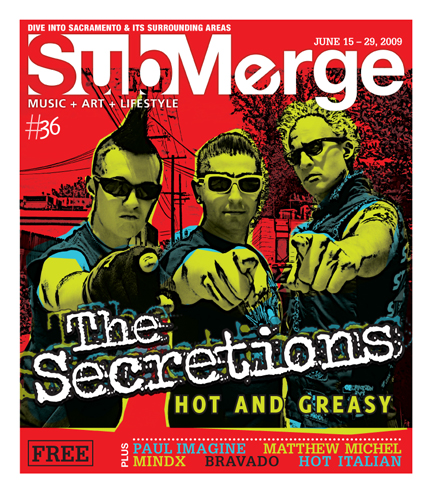
Preview The Secretions new record, GREASYHOTMEETCHEEZY, at Capitol Dawg on July 2. Catch them live at the Blue Lamp on July 3 and at the Boardwalk on July 20. For more information visit myspace.com/secretions or secretinlifeline.blogspot.com
Dance Gavin Dance Has A New Line-up, A New Record and Big Summer Plans
Dance Gavin Dance has seen more roster changes than an MLB team. It’s tough to pinpoint why the Sacramento-based post-hardcore band has had a tough time keeping members, but one thing is for certain: it never slows their tremendous momentum when someone leaves. If anything, it further fuels the fire lit within their fixated fans, who cause a ruckus on Myspace pages, Twitter updates and message boards. The band owes a lot of their success to the Internet and their young, tech-savvy fans who never hesitate to turn to their computers, iphones and Blackberrys to show their undying love (and, in many cases, hate) toward the band.
With their third full-length album (Happiness, due out June 9), a new lineup and the entire summer spent on Warped Tour to look forward to, the band seems very happy indeed with where they are. Submerge recently sat down with guitarist/co-vocalist Will Swan during a rare break from touring to chat about the new record, hitting the road and their dedicated, albeit crazy, fans.
I got a copy of Happiness to prep for this interview and I must say, it sounds a lot different than previous material.
It always does; every new record is way different than the one before.
Is that something you go for consciously?
I just want to write whatever comes out. Being the main writer, I try not to have an agenda. So every record, I feel, is just a natural progression. This is just what we were feeling at the time.
The guitars seem less distorted and sound much clearer. Can you talk about that?
We wanted to get a really clear tone so you can hear all the riffs. It’s more like a classic rock tone.
Rhythmically speaking, it seems groovier and almost dance-y at times too.
Yeah, I wrote “Don’t tell Dave”—it’s song number eight, the like, dance-funk song—while we were on tour with Senses Fail. I recorded the drums, bass and guitar. I just wanted to play it with the band [laughs] and they were down, so I taught them the song. It just kind of came together. I was really happy to be able to put it on the record. I have lots of funk influences; I like George Clinton a lot. There’s definitely a lot of funk that came through on this record.
You took over the screaming responsibilities after John Mess left the band. Is that something you’re comfortable with?
You know, at first I didn’t really like it. I’ve gotten a lot more comfortable and better at screaming. On the new record, being able to write my own parts and now being able to perform those songs, it’s a lot better feeling than playing someone else’s stuff.
Would you say Happiness is your best material to date?
Yeah, well of course, I always like new stuff [laughs]. I do hardcore comparisons between records. I feel like this one is the most cohesive vocally. Me and Kurt [Travis, lead vocals] worked together to try and come up with actual themes. We worked more together as one.
There’s one part on the record that really stood out. Who is that rapping halfway through the song, “Powder to the People?”
That’s me.
No way! It doesn’t sound like you at all. How did that idea come about?
Everyone keeps telling me that; I had to lay something over that song and I didn’t really know what yet. I got to the studio and our producer calls me and says, “I’m not going to be there for half an hour.” So I just sat there and listened to the song and thought, “What can I even do here? Rap might work!” So I just wrote the rap right there and when our producer got there I laid it down and he liked it. That song was already so weird I thought it would be cool to do something off the wall.
Another track I’ve been curious about is, “I’m Down with Brown Town.” What does that song title mean?
It’s got a couple meanings. It’s a heroin reference; it’s also an anal sex reference, it just kind of came about. While Kurt is singing, “I’m down with Brown Town“ [on “Nasa,” the track leading up to “I’m Down with Brown Town”], I’m screaming, “it’s only seconds away,” then the next song starts.
So you’re foreshadowing the next song?
Yeah, exactly. But kids online have no idea; they are all confused. Then “I’m Down with Brown Town,” the actual song, has another heroin reference; it’s like the heroin section of the CD. None of us have had a heroin problem, but we know people who have. Those songs kind of tie together both musically and lyrically.
You guys will be shooting a new video soon. What song will that be for and can you hint at the treatment?
Yeah, up in Portland. It’s for the song “Tree Village.” We’re doing all our stuff in one day, then there will be other shoots for the story while we’re not there. So we’re going to go up there and do what we got to do. The treatment for the video, I’m going to keep that under wraps. It’s a weird, kind of abstract treatment. It’s more visual; you’d have to experience it. Anything I said about it would just be like, “what the fuck?”
You’re doing a couple weeks with The Audition and Closure in Moscow leading up to Warped Tour. Are you looking forward to the summer?
Yeah, for sure. I cannot wait to go on Warped Tour. We’ve never done Warped. We played it once in Sacramento, on the Ernie Ball stage. It was fun; we had a good crowd. If we have a crowd like that every day, it would be great.
Your lineup has changed again recently. Are you confident it’s solid now?
Yeah, I think so. I always feel pretty solid about it, though. [laughs]
After perusing your Myspace comments, message boards, etc., I’ve come to the conclusion that you guys have some crazy fans. Why do you think so many people love to hate you guys?
[Laughs] The Internet is just a place for people to complain. They don’t even understand. I try not to pay attention to anything anyone says anymore. Our fans are so crazy. I cut my hair, because it’s getting hot you know? And I’ve been getting a ton of shit for it. Kids are like, “Why did you cut your hair?”
Yeah, you had quite the afro going on. So they’re missing it?
Yeah, they totally are!
Though Sacramento’s Buildings Breeding Started as a Joke, the Band is Serious About Moving Forward
A perusal of Buildings Breeding’s Myspace page will show that the band has a sense of humor. The tagline under the band name describes the group’s genre as a fantastical mix of “healing & easylistening/religious/black metal.” Of course, even a brief listen to Buildings Breeding’s music reveals anything but. In place of these incongruous genres are dreamy male/female vocals bolstered by jangly pop melodies and swift percussive sensibilities. Perhaps “easylistening” isn’t too far off the mark, because the band’s songs are just so catchy.
Buildings Breeding’s ability to poke fun at itself may stem from the fact that the band started as a bit of a joke—albeit a romantic one. Frontman and founder Chris Larsen started the band as a way to confess his feelings for his girlfriend and now band mate, co-vocalist Melanie Glover. Larsen concocted Buildings Breeding as a fake band with its own Myspace page in order to reach out to Glover while she was abroad. This quirky back-story is a bit of a bane and a boon for Larsen.
“It’s kind of a silly story that we’re trying to get away from,” Larsen says with an uneasy laugh. “That story is haunting us our whole career.”
Whether the band was make-believe or not, its music struck a chord with Glover, and others as well. While still living in Davis, Larsen sent his songs out to Mushpot Records, which signed Buildings Breeding, even though it technically didn’t exist.
“I was pretending to be all these people. I submitted to them just as a joke, and they wanted to put out the record, so I was like, I better put together a band then,” Larsen explains.
“I don’t even know if I ever told them, because I didn’t want to ruin the chances of getting my record released.”
Now just a few years after Larsen conceived the band (he says he got the idea in 2006, but the group didn’t really come together until 2007), Buildings Breeding has bloomed from an inside joke to a bona fide five-piece with a bright future ahead of it. This month, the band will release its first nationally distributed album, In the Key of Calloused Fingers on venerable Bay Area indie Devil in the Woods. The album will be available on vinyl, limited to 300 copies (a digital version of the album was released April 28 and can be purchased via iTunes and other online music stores). The album is a compilation of older material from prior Buildings Breeding releases chosen by friends and fans and also some newer songs. Fittingly, Larsen says the title “¦Calloused Fingers also has a humorous connotation for the band.
“[The album] is kind of like a collection of what we’ve been doing for the past couple years,” he says. “We’ve been playing them so much, our hands are calloused.”
Using Myspace, Last.fm and other sites, Buildings Breeding put the “¦Calloused Fingers‘s tracklisting up to a vote. And in some cases, the band was surprised with what their fans chose.
“It brought some songs that—at least for me—weren’t first picks,” says Chris Vogel, Buildings Breeding’s bass player. “There were some songs that did really well off the self-titled [album], but some of the fans picked some of the deeper songs on that record, so it was nice to include them on “¦Calloused Fingers.”
According to Larsen, letting fans choose their favorite songs keyed the members of Buildings Breeding into which of the songs were working better than others.
“When you have people e-mailing you what songs they like, you kind of know what your live shows should sound like,” Larsen says. “There are some tracks that, in my heart, I thought people might like, but it definitely gets you on the right direction as to where to take the band. It’s obvious when you listen to this record, people like certain ways we go better than others.”
However, both Vogel and Larsen say that fan reaction alone won’t drive the music behind their next recording.
“I think what the fans were telling us by picking the songs was definitely important, but at the same time, we want to grow as a band,” Vogel says. “You can sit and make songs that everyone’s going to like all the time, but you’re just going to fail.”
Though the songs on “¦Calloused Fingers may be new to many people nationwide, Buildings Breeding are more than familiar with them. The band is looking forward to recording new material. Larsen hopes the band will re-enter the studio sometime after May.
Whether fan reaction plays any part in the road ahead for Buildings Breeding will remain to be seen. A larger affect on the direction of the band’s music will probably come from the band’s desire to write their next album together, as opposed to Larsen as primary songwriter.
“With five different people’s input, you don’t know where that’s going to take you,” Larsen says. “I think creating a record together will be the happiest thing we can do.”
Recently, Buildings Breeding was injected with new blood. Kevin Dockter stepped in on lead guitar and Justin Titsworth joined as the new drummer. Both members have had a big impact on the band. Vogel and Larsen both praise Dockter for his “tasteful” playing.
“Kevin instantly just opened up a new door for us with his guitar parts,” Larsen says. Kevin really embellished the songs.”
Meanwhile, Titsworth has taken the band to “the next level,” according to Larsen. Titsworth’s arrival allowed Glover to step out from behind the kit and be more upfront with her vocals, with out causing Buildings Breeding to lose anything rhythmically.
“Some of her songs are our best songs and fan favorites, our top sellers of whatever we sold in downloads,” Larsen says. “It really made me disgruntled to not be able to do that properly. It definitely changes everything to have everything we want going on while she’s singing.”
“I think we’re at a point with five members that we can branch out and bring some new stuff to the table that we haven’t been able to before,” Vogel adds.
With a solid roster in place, it would seem that the good humored members of Builidings Breeding have plenty reason to be resolute going forward—whichever direction their music takes them.

Vivian Girls, Abe Vigoda, Agent Ribbons, Dog Party
Luigi’s Fun Garden “¢ Friday, April 24, 2009
By Blake Gillespie | Photos by Samantha Saturday
From the deck of Luigi’s Slices & Fun Garden, you could see over the security fence into the Wyclef concert on K St., but inside of the Fun Garden housed the most entertaining performances of the night. Besides, who wants to hear “Ready or Not” without Lauryn Hill? Yes, Pras can stay home.
The wall-to-wall capacity audience in the Fun Garden made it difficult to see the opening band, Dog Party. Granted, Dog Party is comprised of two Sacramento native 12- and 10-year-old sisters, so even working through the bodies to a closer position might not grant visibility.
It is about hearing Dog Party that matters most. Gwendolyn and Lucy Giles are too adorable and punk to be true. I am tempted to assume either they have a rad music teacher or even radder parents pushing good music on a future generation. Dog Party opened with covers of TV on the Radio’s “Young Liars” and followed it with Credence Clearwater Revival’s “Have You Ever Seen Rain?” Surprisingly, it flowed well. Even better, the girls presented a few original songs; mostly simple three cord post-punk about how it blows going back to school. Dog Party gets the nod of approval for sticking around the remainder of the night. There’s nothing more punk than staying out after the streetlights come on.
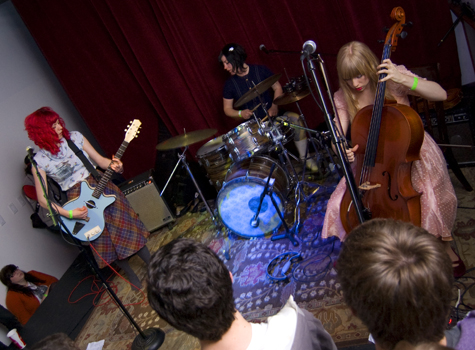
Agent Ribbons continues to prove they’re meant for attention larger than the Sacramento art galleries. In fact, it’s time Sacramento embrace the Ribbons girls as indie darlings poised for national notoriety before we lose them to some hip coastal city that will value their potential. Agent Ribbons is a delightful balance of blues and baroque—like hearing a set of songs inspired by The Velvet Underground’s “After Hours.” For every gentle nursery rhyme about the birds and the bees, there’s a naughty pun about the “sticky and sweet” side of love. Agent Ribbons tested out a new song, timid in presenting a song not yet mastered, but it played out without a kink. The ladies have the look, a treasure trove of songs, and a seasoned patience to draw the audience in for a shredding coda.
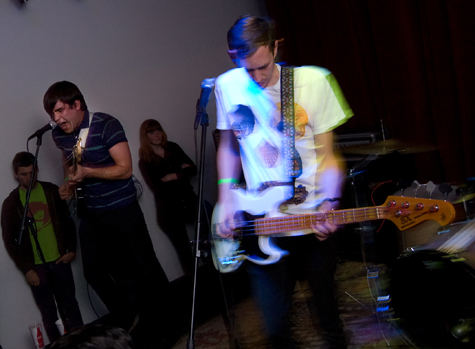
After a brilliant showing by local talent, it was time for the touring acts to seize the evening. Los Angeles’s Abe Vigoda got the gallery buzzing with its massive math dance sound. It’s always impressive to hear a band turn blistering finger chords into body moving rhythms. But, it’s bothersome to feel like it’s time to sway a little, only to be interrupted by a-rhythmic progressions. I gave up my inclinations to nod or move to Abe Vigoda simply because it required too much attention. In giving up, I heard chatter of appreciation in the Garden, so perhaps it was just me. It should also be noted that Abe Vigoda felt unwelcome amongst a bill of girl bands—as though the boys just had to break up babysitters club.

Vivian Girls can try their darnedest to not be dreamy, but even in their ambivalence, the ladies maintain an alternative sexiness. It’s in the reverb and harmonized vocals, but it’s mostly the bangs. Our mothers screamed uncontrollably for Beatles bowl cuts. Now their sons quietly long for the Brooklynite girls with tattoos and bangs.
Vivian Girls betrayed my reception of their self-titled debut. Live the Vivian Girls traded in the spiritless performance of songs like “I Believe in Nothing” for an untapped energy that was easily trapped within the Garden’s tight walls. The set felt like it was over before it even started, but it was tough to demand more from a band, barely 2 years old, with a 22-minute debut and limited B-sides.
Local four-piece difficult to define
Happy 4/20. If only you were in Arcata, you could be ZuhGin’ out.
After CD release parties in Sacramento and Roseville last week, the four-piece from the City of Trees cruised the ZuhGmobile to Humboldt for a weekend lineup of shows capped off by a 4/20 celebration Monday at the Humboldt State University Quad.
ZuhG will perform at noon at Sierra College in Rocklin on Thursday. The evening before, on Earth Day, they have an all-ages gig at Pyramid Alehouse in Sacramento.
On the April Second Saturday Art Walk, in Sacramento on April 11, ZuhG lured the audience away from the art and the couches in the back of the Blue Lamp to the dance floor with their set that featured songs from their new album ZuhG Life. A heap of jackets piled onto one couch beneath the artwork of Brian Nichols, ZuhG’s frontman.
“Listen to OutKast,” Nichols said while they played a “So Fresh So Clean” interlude.
Shoeless, Nichols led the band on guitar and vocals. Justin Vance opened their set with his bassline for “Accessories,” an homage to the mundanity in life.
Brian “Bot” Swart was the highlight of the night and, in a way, he is in ZuhG Life, playing tenor saxophone, giving the band the sound they want—”to be unlike others,” how they define ZuhG.
Self-taught drummer Matt Klee said in an interview at Nichols’s house that in order to get better he had to get uncomfortable. So, with Nichols, he took a jazz ensemble class at Sierra College a year ago. That’s where they met Bot.
In that class, Nichols said he met a mentor of sorts who taught him jazz guitar.
“I wanted to play jazz guitar, and he played way sicker than me,” he said. “Now, it’s all about practicing daily. We’re trying to get better every day as a band.”
A semester’s worth of jam sessions and Bot was a part of ZuhG. Though it wasn’t their intention, he replaced the band’s cello player, Jarrod Matthews, who left the band after Bot’s sax was added. (ZuhG Life’s bonus track features an improv session with Matthews and Bot.)
The youngest in the band at 19, Bot gives ZuhG its jazz element that makes the funk-rock-reggae-jam—whatever you’d like to call it—band a little hard to categorize. Last year ZuhG was nominated for a Sammie in the SN&R in the R&B category. This year, they earned the nomination in the Jam Band category. Recently, High Times Magazine online added them as an unsigned band of the week.
Both Bot and Nichols are studying music, though Nichols is at Sacramento City College now.
Local radio station KWOD 106.5 plays their song “Shangri La,” because it’s “reggae enough,” Nichols said at his house. “I wanted them to choose ‘Lately,’ but they said it was ‘too jazzy.'”
Bot and the guys laughed it off. “Too jazzy is a compliment,” Bot said.
Surely their music wasn’t too jazzy, or maybe it was, to make enough cash to produce ZuhG Life at Sacramento’s Pus Cavern Studios. The recording is great.
“We’d like to thank Northstar and Sugar Bowl for funding this album,” Nichols joked, because they were able to book a couple shows a month at the Tahoe resorts during winter.
Tahoe in the winter. They’ll see the coast for spring. From San Jose to Ocean Beach they have shows lined up along the coast for two weeks until they return to Davis to play the G. St. Pub, May 16 at Beatnik Studios Boobie Bash and May 23 at Marylin’s on K.
Consider This!
It doesn’t take too keen a memory to recall when the underground was rocked by a relatively new animal; a post-hardcore beast gnashing a row of melodic incisors, besmirched by a heavy metal overbite. The critics called it metal-core, then screamo, then a whole host of hyphenated hyperbole until a style of song that sprung from an Iron Maiden fever dream began to homogenize, embraced a pussycat’s slippery sheen, and is now essentially a safe haven for tough kids gone soft. It’s sad but true: Screamo is a fucking joke. Metal-core is a caricature in a Mall of America comic strip. The death rattle for a once mildly exciting punk rock overture has shaken its final clangs.
Sacramento’s Consider the Thief (nee Heartshed) has been toiling within the confines of this breakdown-heavy haze. They are set to release what will no doubt be regarded as either a complete about-face from what their fans expect, a risky career move in a still-fledgling existence, a “fuck you” to what would have surely been a cakewalk into the mainstream-or most likely all three. Guitarist Sean O’Sullivan, formerly of Dance Gavin Dance, attempts to explain the chronology of events leading to this spring’s release of Signs and Wonders.
“All of us paid our dues playing in heavier bands for years before this,” explains O’Sullivan. “After the release of Soldiers and Saints [the band’s self-released debut EP] we decided we wanted to take a leap of faith and write songs that didn’t rely on what had become a crutch for us: screaming and busy guitar/drum work.”
Soldiers… found the band contented in a sound equal-parts Vheissu-era Thrice and a just-crowning Thursday, emerging behind a wall of punishing metal riffs and algebraic time signatures, capped by guttural yelps and pin-prick melodies. It was an underground release that garnered the praises of everyone from Punknews.org to mega-hip glossy rag Alternative Press, who placed the group among their “100 Bands You Need To Know” in 2009.
While still unsigned, the band (rounded out by pianist/vocalist/guitarist Dryw Owens, vocalist/guitarist Jordan Wells, bassist Zack Walkingstick and drummer Lucas Allen) seemed to realize that their artistic bents remained malleable, and with a creeping disdain for the impending creative flat line of their young catalog, they turned a musical corner.
The process was a trying one for O’Sullivan.
“Writing this record was pretty intense for all of us,” says O’Sullivan. “The first song we wrote after the EP was the softest any of us had been a part of. There was that learning curve with the new material, how to go about writing more dynamic and emotive songs. I suffered writer’s block at one point and during that period experienced a lot of growth and was humbled by watching the other guys write.”
The result of such growth has ushered in an atmospheric wash of layered songwriting more akin to the vibrancy of UK sonic-rock supergroups like Radiohead, with a marked emphasis on lyrical themes. These themes rear most poignantly with takes on the Christian parables “The Good Samaritan” and “The Prodigal Son.” But O’Sullivan is quick to note the band’s neutral stance with regard to the presumed theological imprints on their music.
“It wasn’t really a purposeful thing at first,” explains O’Sullivan. “I personally feel it’s important for an album to have a well-rounded lyrical theme. My biggest worry with the lyrics on this record is that people would think that we’re some sort of bible-thumping Christian band. These stories Dryw sings about [are] just as powerful to an Atheist as they are a Wiccan or a Catholic. We’re not trying to convert anyone with a sing-song Jesus chorus; we just want to convey the power and relevance these stories still have.”
The fear of alienation, while something that most artists might invoke as tantamount, took a back seat for Consider the Thief in the process of writing their new material.
“We had a good laugh as we were writing these songs,” says O’Sullivan. “We knew that the kids who love our old material would most likely not gel that well with the new stuff. The vast majority of people have had nothing but good things to say.”
With their initial successes, O’Sullivan points out the band’s gratefulness for exposure on a national level while still remaining unsigned. Signs and Wonders will be self-released by the band, and should be available exclusively on iTunes by May, with a CD release show still in the planning stages. In the meantime, Consider the Thief is gearing up for its future.
“We’ve been so focused on writing and recording that we hadn’t really thought too far into the future, but we are now,” says O’Sullivan. “The reality is sinking in that we have to move on this—that this is something really important to us and, hopefully, to others, is really motivating us to spread it around.”
Breaking a mold that in previous bands they most assuredly helped create is bound to receive attention, good or bad. For the record, O’Sullivan summed it up as succinctly as possible.
“What bugs me most about the current music scene is the overwhelming fear of failure bands seem to have when it comes to doing their own thing,” he explains. “Bands are giving up because they can’t survive and we’re seeing good, hardworking bands break up or lose members to horrendously awful Auto-Tuned crunk groups, and there’s no desire to attempt something that might not pan out. I’m not saying we have that ideology of creativity cornered, but I can for sure say that the record we just wrote is as honest a record that I’ve ever been a part of, and I’m 100 percent proud of it and of the guys I work with. Hopefully people take notice of the bands that are working hard and support them so that they succeed…otherwise we’ll see screamo-crunk-whatever in the top 40!”
What’s More American Than Apple Pie?
Sacramento-based Izabella is set to have their CD release party for their third album, Drugs and Apple Pie, at Marilyn’s On K April 11, 2009. Politically inspired, the album is a product of the election, and a reflection of the supposed positive change that some feel has yet to materialize in the fledgling Obama administration. Now playing keys for Izabella, Jeff Coleman spent last campaign season as a deputy field director for Obama in New Mexico.
“The album is a comment on the bullshit we’ve all been through the last eight years,” lead guitarist Sean Lehe said from a thrift store in Provost, Utah, where he shopped for a Mad Hatter costume for the Alice in Wonderland-themed gig they had in Boise the next night. This is their third album in just more than two years, a “reflection of a young band trying to pull it together in today’s day and age,” Lehe said.
Drugs and Apple Pie comes from the lyrics in the second song on the album, “Bittersweets,” and though the album has political undertones, there is plenty of the band’s specialty—jam rock fused with funk, reggae, bluegrass and jazz. Or, “Norcal rock,” as Lehe described it.
While four of the group’s members claim Sacramento as home, another is from Chicago and the other from San Luis Obispo. “The six of us have a lot of history together,” Lehe said. “We sort of coalesced out of a number of different bands.”
And their musical style reflects that. At shows, they’ll cover the Beatles, Dylan, 2Pac and Ginuwine. They’re influenced by what Lehe calls “pop music from the last 40 years” such as Michael Jackson, Stevie Wonder, Led Zeppelin, Phish and the Grateful Dead.
To pull the album together, Izabella spent two weeks in early February recording in Cotati at Prairie Sun Studio. There, the six-piece found their “natural element,” and they worked with producer and engineer Oz Fritz, who’s worked with greats like Tom Waits, Iggy Pop, The Ramones, Herbie Hancock and countless other musicians.
“Everything was really green in Cotati,” Lehe said, explaining the band’s name, Izabella, “represents the feminine energy of creation—not to sound like a dorky-ass hippie.”
Feminine energy of creation? Izabella is also the name of a Jimi Hendrix song, but these guys are some dorky-ass hippies, and they know it. “Yeah, we don’t mind tie-dyes, and we like to watch girls’ hips when they hula-hoop,” Lehe said.
When they finished in Cotati, the band hopped in the Portabella, a 40-foot 1988 MCI Bus, for their tour of the West. They’ve meandered down the coastline and through the Rocky Mountains, playing Denver for St. Patty’s Day and then Boise. Their tour will take them to Sparks, Nev., then on to Chico and finally to Sacramento for the release of Drugs and Apple Pie, where Seattle’s Flowmotion will open for them. The band is confident Drugs and Apple Pie will bring success.
“We’re dropping one of the hottest records a Sac band has dropped,” Lehe said. “And I’ve lived in Sac a long time, so I can say that with confidence.”
No Guns, No Problem
With their complex instrumentals and emotion-packed lyrics, Sacramento band Find Me Fighting Them has every right to be excited about the upcoming release of their EP, It’s a Big Bad World and I’ve No Guns to Fight With. As the poignant notes unfold, you’ll discover shades of At the Drive In, Minus the Bear and a definite Radiohead influence.
The band was originally called Audrey Is a Narcissist, and was formed several years ago when singer and songwriter Jeff Wright was still in high school. Drummer Cliff Mattis and guitarist Matt Nielsen have also been long-term members of the band.
In 2005, they made the decision to change the name from Audrey Is a Narcissist. “It’s a tongue twister,” Wright explains. He states that when first hearing the name, the usual reaction was, what? Hoping that a name change would also free them from some of the negative history associated with the old name, they began brainstorming.
Wright was largely responsible for the choice of the new name, Find Me Fighting Them. “A lot of names we came up with weren’t as meaningful or as challenging,” he explains. “It seems like everyone is always having a struggle. It was more of a way that we could express everything we were going to try and write about in the band with our name.”
The band has been through several changes in band members. When Julie Baenziger joined the band, she was originally supposed to play bass—but it turned out she had a wide array of musical abilities. “We felt that it was completely stupid to not utilize her other talents,” Wright says. Baenziger now shares vocals with Wright, as well as working with keyboards and percussion. Current bassist Max Mitrovich joined just this past February.
In addition to singing, Wright also plays guitar and drums, and now crafts all of the lyrics for their songs. He begins with events that have happened in his own life, and uses metaphors to express them in the songs. He often follows a particular concept throughout a collection of songs, such as the idea that people aren’t meant to work meaningless jobs day after day. “People aren’t meant to go to work every day, sit in a cubicle, file papers”¦I don’t think people are meant to live to work,” Wright explains.
This really hits home in Wright’s own life, as he’s done everything in his power to ensure that his work and his passions can peacefully coexist. He has been running a recording studio from his home since high school, and graduated at age 16 in order to pursue a certificate program in commercial music recording at American River College. At only 18 years of age, he has already recorded albums for a variety of bands.
Having just moved out of his parents’ house, his most recent songs are about that transition between a stable home with mom and dad and being thrown out into the real world. Wright moved to Midtown last July, where he now lives with Baenziger and Mattis. Mitrovich lives only a couple of blocks away. This camaraderie is a large factor in why their music works so well. “The main thing behind us is we’re friends before musicians,” says Wright. “It makes for good chemistry.”
Find Me Fighting Them had one release last year—a full-length album entitled You Are the Machine. This album combines the talents of Mattis, Nielsen, Wright and former bass player Mylan Myers. While the band was happy with the outcome, the album was also a learning opportunity. “We wanted to do something more artistically creative but still with a pop sensibility to it,” Wright explains. “And still mixing in experimental and shoegaze style.” Wright defines shoegaze as “a style that is more focused on healthy musicianship.”
Currently, they’re in the process of releasing the EP, It’s a Big Bad World and I’ve No Guns to Fight With. The EP also features former band member Matt Vincent, who does the bassline for the song “Two Years Without Roads.” It is already available for download at iTunes, Amazon and Rhapsody, as well as the band’s Web site. The physical copy will be available March 6. Their CD release party will be held in Sebastopol, where they will play with Pet Sounds and Oh Apollo.
The band has already started on their next two releases, both of which will also be EPs. “Our main focus is to get all of our material out there,” Wright says. “We want to spread it out.” One of the EPs will be a handful of songs they have recently been working on, and the other will be a CD of covers, which includes their versions of songs by Radiohead, TV on the Radio and the Yeah Yeah Yeahs.
The band has played about a dozen times since they officially became Find Me Fighting Them, but Wright feels that their upcoming shows will be their best yet. Before, they were really just “testing the material,” he says. Overall, Wright hopes that anyone who attends one of their shows will take back something bigger than just having a good time. “It’s a pretty big emotional release [for us]. I want [the audience] to feel something too.”
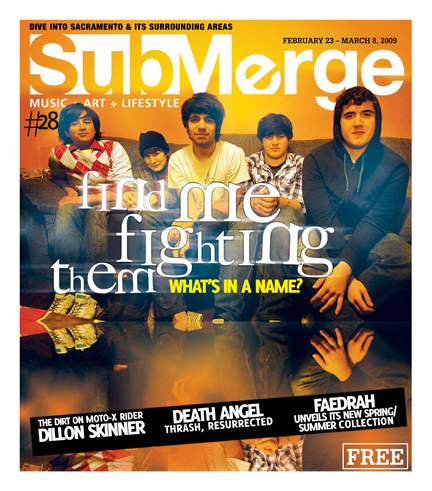
Church Underwater
The ocean is home to the world’s largest creatures. One of the most fascinating of these mammoth beasts is the giant squid. Rarely photographed, its elusiveness belies its ponderous size. As a result, the mysterious creature has inspired folklore, myth and art worldwide. It is fitting that such a beast would serve as the moniker for San Francisco-/Sacramento-based metal band Giant Squid. Titanic in sound, Giant Squid is difficult to categorize. Though the band leans heavily on the tenets of doom/stoner metal popularized by groups such as Isis—riffs are heavy, thick, slow and hypnotic and paired with wailing vocals laden with despair—Giant Squid pushes the avant-garde metal envelope even further, tossing in atmospheric keys, horns and strings into the mix. This strange sonic brew made the group’s debut full-length, 2006’s Metridium Fields, a noteworthy release for underground metal fans. On Feb. 3, Giant Squid may extend its reach even further with the unveiling of their latest album, The Ichthyologist.
Weirder, heavier and deeper than the group’s previous efforts, The Ichthyologist is a sort of heavy music kaleidoscope. Considered separately, the songs seem to share little in common with one another: The jazz-y “Sutterville” sways like a drunken zombie lounge singer; while the opener “Panthalassa” starts with a sinewy, serpentine guitar line that snakes into a wall-squalling metal noise. Yet, when listened to as a whole, these disparaging colors form a mesmerizing picture.
A portion of the album’s success should be credited to the man turning the knobs. In-demand heavy music producer Matt Bayles, who has worked with the aforementioned Isis as well as Mastodon in the past, served as producer for The Ichthyologist. According to Giant Squid singer/guitarist Aaron Gregory, the band, without the backing of a label, pooled its resources to pay Bayles’s considerable price tag.
“Everyone in the band chipped in their savings and then some,” Gregory says. “We sold some gear, and we finally got around to putting the rest of our Monsoon EPs online, and made some money off of those real quick. We managed to do it somehow. We put together a really large sum of money and hired him.”
It was money well spent. During our interview, Gregory refers to Bayles as a “taskmaster,” but says he appreciated the producer’s strictness.
“He really whipped us into shape, and made us make sure we play every note to the best of our ability, or he wouldn’t let it go,” Gregory recalls. “It’s one of the first records I’ve walked away from and said, ‘I’m pretty much OK with every single thing I did on that record.'”
The Ichthyologist‘s cohesiveness may also be attributed to its concept. The album coincides with Gregory’s first, yet-to-be-completed graphic novel by the same name. Gregory says that the comic book version of The Ichthyologist is, in part, inspired by The Swamp Thing. “I love the idea of a man becoming something so much more than a man, and yet kind of less than a man, and the spiritual heaviness of Swamp Thing, especially when Alan Moore started writing it,” Gregory says of the classic DC Comics character.
Gregory, a professional SCUBA diver working at San Francisco’s Aquarium of the Bay, discussed the audio, visual and philosophical aspects of The Ichthyologist in a recent interview.

You’re self-releasing The Ichthyologist in a limited run of 1,000 copies. What made you decide to take that route with the album?
We spent an incredible amount of money to work with Matt Bayles, and we’re maybe not the caliber of band yet that could get a label to pay us right upfront enough money to hire Matt Bayles. Honestly, I doubt most labels would be able to give us half of the advance we would need to work with Matt. Because we did it for ourselves, we wanted to make sure that we didn’t give this album away to a label for nothing and we all kind of lose our ass. In all reality, you don’t see hardly any money back from small labels. That’s just part of it. That’s fine too, because they work their ass off and they have bills to pay too. In this way, if we sell a thousand of them at 12 bucks a pop, we get all of our money back. We get to break even. We’re at the level that we can do that on our own, for sure. The pre-sales are already exploding. We sell a shit-ton of them every day. Hopefully when all is said and done, we would have signed a new label deal or two, six months after the release, it’s our goal to find someone to put it out on vinyl and put it out on CD.
I’ve read that The Ichthyologist is based on a graphic novel that you’re working on. Would you like to talk about that?
Yes, the album is based on a graphic novel I’m writing that goes by the same name. The protagonist has lost it all in haphazard ways and takes on the abilities of a sea star to survive it, and thus begins this huge journey, that no matter what happens he ends up healing, because sea stars have this regenerative ability. The album is basically the poetic description of my character’s origin. It’s the poetic downfall from the beginning to the end of his origin. The graphic novel goes much, much more past that.
Did you know that you wanted to tell this story both musically and as a graphic novel, or were you not sure?
I came up with the album title first. I thought that would just be a great album name, The Ichthyologist. It’s perfect for me—perfect for Giant Squid. Then I was talking to someone in the comic book industry, a good friend of mine, about some ideas to pitch for the company he works for, which led me to this concept, under the same name. The songs had already been written, and I worked the general themes of those into the story. There’s a song on there called “Mormon Island,” which is a very old gold mining town in the Sacramento area that’s long since gone and is now actually sitting at the bottom of Folsom Lake. We were writing this very creepy song, and someone said that it sounded like a church underwater, and I was like, “Shit, I know where there’s a church underwater. There’s a church at the bottom of Folsom Lake, a town called Mormon Island. We’ve got to call this song ‘Mormon Island.'” Then I was like, “How can I work Mormon Island into the story?” And by doing so, it opened up all these different angles into my story. So, as I’m writing the graphic novel, writing the album helped inspire a lot of different things, and vice versa. There would be ideas, right from the get-go, like, “I have to write a song about this moment in the dude’s creation, this moment in the guy’s downfall,” and so on.

Looking at the other titles on the album, there’s one that mentions the Donner Party; and Ernst Haeckel, whose image you used on the cover, has a peak named after him in the Sierra Nevadas. There’s also a mention of the La Brea Tar Pits. I don’t know if it was intentional, but the album seems to have a very firm sense of place. It’s very Californian.
Absolutely. I’ve always been obsessed with California history, and have incorporated it in a lot of ways, sometimes more subtle than others, in all our albums. We also had a 7-inch called “Sutter’s Fort,” and there’s a sequel to “Sutter’s Fort” on The Ichthyologist called “Sutterville,” which is more or less about Sacramento refusing to give up its capitol-ship. Sacramento kept flooding in the 1800s, and people kept saying, “You need to move your capitol. This is a pretty shitty fucking place to have a capitol.” And Sacramento refused to give it up, and after huge bouts of cholera and death and that kind of shit, they just raised all the streets 10 feet in the air. The actual story of The Ichthyologist is time-hopping as well.
There’s a mix between the human history of California and the natural history as well. Does working in marine biology allow you to see the scope of both? I would imagine being underwater, you can see how the Earth grew up out of it.
You know, not to get too heady, but when you’re 40 feet down at the bottom of the ocean in Monterey and you’re surrounded by kelp and a rocky reef and tens of thousands of fish swimming around”¦you are basically staring right at the godhead. You’re staring at the spiritual center of it all. As far as our planet goes, it all came from right there. You also never have felt like you belong as much as you do when you’re down there. It’s a very strange and surreal sense. It opens up a lot of spiritual thought and philosophy, and who we are in the grand scheme of things. The album is a little heady in some ways, because it does touch on stuff like that. The grand result of the graphic novel kind of deals with that—God being underwater. People go into the seas to talk with God.
